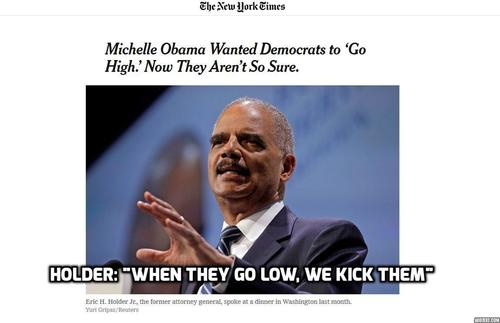
NEW YORK TIMES Considers whether Leftist Violence Is Productive for Them
10/14/2018
Saturday’s New York Times front-paged a rather amazing headline:

Actually, the headline should be “Democrats Debate whether High Road in Politics Is Leading Anywhere” but the grammatical mistake is not the worst offender.
Surely the headline is a wild mischaracterization at best, since leftist mobs have been attacking citizens and political figures increasingly since the Trump election. The “high road” — if it ever existed — was abandoned on November 8, 2016.
And lefty media doesn’t like the “mob” word, despite its accuracy regarding violent behavior:
A March 2017 pro-Trump demonstration in Berkeley ended in violence when masked antifa thugs beat up and pepper-sprayed citizens, as shown below.

Here’s the violence-friendly Times story, reprinted in the Santa Fe New Mexican linked below:
Democrats less sure about ‘going high’, New York Times, October 13, 2018
WASHINGTON — In 2016, Michelle Obama’s words became the Democrats’ defining creed to counter Donald Trump’s battering ram of a presidential campaign: “When they go low, we go high.”
Two years later, the appeal of “high” seems low.
As much as any policy tensions or messaging debate within the party, this question of tone — of how to combat Trump effectively without slipping into a pale imitation — is perhaps the central divide of this Democratic moment (and the next one, with the 2020 campaign looming).
How will Democrats choose to revise Obama’s sentence, with Trump heaving insults from the White House and the rally stage — his pre-midterm bully pulpit?
“When they go low, we kick them,” Eric Holder, the former Obama administration attorney general and a possible 2020 candidate, said this week.
“When they go low, I say hit back harder,” Michael Avenatti, the cable-ubiquitous lawyer flirting with his own presidential run as a Trump-style brawler, told a crowd in Iowa over the summer.
Few but Michelle Obama seemed inclined to defend the original refrain. “Fear is not a proper motivator. Hope wins out,” Obama told NBC on Thursday.
But for many Democrats, it does not seem to be winning out, at least for now.
It is one thing for Avenatti, the telegenic anti-Trump id, to seize this kind of rhetorical real estate. But increasingly, much of the Democratic establishment seems to be marching that way, too, channeling the righteous anger of the progressive base.
Going high, these Democrats say, got them minority status across the federal government. Going high got them a president accused of sexual assault, installing a Supreme Court justice accused of sexual assault (both deny it).
“You cannot be civil with a political party that wants to destroy what you stand for,” Hillary Clinton told CNN this week. “If we are fortunate enough to win back the House and/or the Senate, that’s when civility can start again. But until then, the only thing that the Republicans seem to recognize and respect is strength.”
Clinton seems unlikely to recommend her 2016 campaign slogan, “Stronger Together,” to the next generation. Yet if she failed to reflect the national mood during her last run, Democrats had spent years before that straining to project indignation in the right proportions.
Former President Barack Obama could seem removed, ever mindful of the minefields underfoot for a black politician emitting fury.
Clinton, before her 2016 turn as a stateswoman and grandmother, staked her 2008 bid on evincing a toughness that could match any man’s.
Former Vice President Joe Biden has held himself out as a Democratic rarity: unwilling to give up on the white working-class voters who lifted Trump, but unafraid to go nose to nose with their president.
The result: down-home paeans to a well-placed whupping.
“If we were in high school,” Biden said earlier this year, “I’d take him behind the gym and beat the hell out of him.”
While the wisdom of such confrontation in a national race remains untested, this year’s Democratic primary season demonstrated that many voters are prepared to reward more insurgent energy in the party. Upsets from movement-minded progressives like Ayanna Pressley in Massachusetts and Alexandria Ocasio-Cortez in New York were powered, in large measure, by impatience with incumbents who lacked what Pressley called “activist leadership,” even if they generally voted as liberals wanted.
At the same time, many Democrats have cautioned against embracing anger as an organizing principle, suggesting that harnessing disdain for Trump is workable only if voters also broadly understand what the party stands for.
“Rage is good. Rage fuels people to step up and pay attention,” said Amanda Litman, a former campaign aide to Clinton who now oversees Run for Something, a group dedicated to recruiting first-time candidates. “That being said, it isn’t necessarily sustainable. It’s hard to be angry for two years.”
Funny how nobody on the left side ever mentions policies they would implement to improve citizens’ lives. They complain about Trump’s “aggressive language” but they are not hearing the president’s plans for action and list of accomplishments.
All the Democrats have to offer is identity politics, and that is thin gruel to be a national party’s main message.
